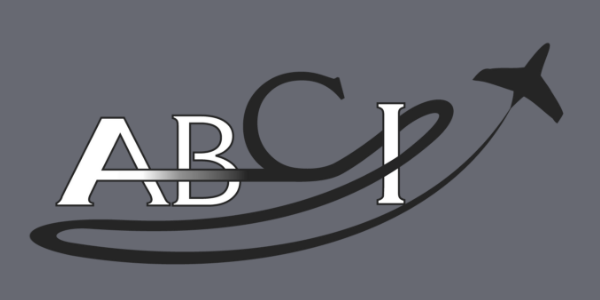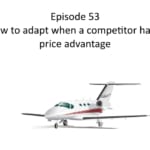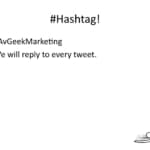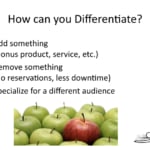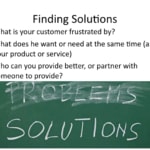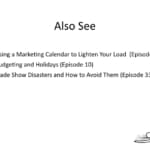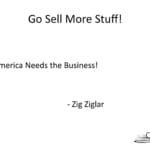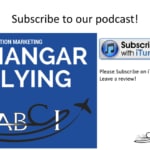Have a competitor that offers the same thing at a lower price? Is it “game over” or are there things you can do to keep your customers and attract new ones?
We think people put WAY too much emphasis on price, and not enough on value.
So, we show you different ways to change your value proposition.
Transcript – How to Respond to a Low-Priced Competitor
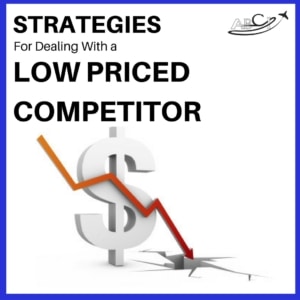 Paula Williams: Welcome to aviation marketing Hangar Flying, episode number 53, How to Adapt When a Competitor Has a Price Advantage.
Paula Williams: Welcome to aviation marketing Hangar Flying, episode number 53, How to Adapt When a Competitor Has a Price Advantage.
Paula Williams: So, I’m Paula Williams.
John Williams: And I’m the good looking guy, I’m John Williams.
Paula Williams: Absolutely.
John Williams: [LAUGH]
Paula Williams: [LAUGH] And we are ABCI, and ABCI’s mission is.
John Williams: To help you folks some of our products and services out there in the aviation world.
Paula Williams: Absolutely, so if you have comments or questions on today’s episode or on anything else for that matter use, the hashtag #AvGeekMarketing, av geek marketing.
We will make sure we reply to every tweet and make sure you get an answer to your aviation marketing question. You can also respond on our website or on our podcast, so we look at all of those things all the time, right?
John Williams: Yes.
Paula Williams: Okay, so if a competitor comes up with a product or service or it offers the same products or service as you at a lower price, it’s game over, right?
John Williams: Well, not necessarily but if you’re uninformed and I’m inexperienced, you might think so.
Paula Williams: Exactly, I know, we have people come to us and say, we run a flight school and our competitor at the same airport offers flight time 172, $10 less an hour than we can afford.
So we’re done we’re getting out of this business [LAUGH] which I think is just absolutely insane.
John Williams: Well, [COUGH] and what prompted, this was I went to.
John Williams: A local shop here in town, that’s run, but it’s a small business. And they sell lawn mowers. Now that’s not why I was there, I was there to get parts for a chainsaw.
But nonetheless, so I was talking to the guy and another gentleman came in and said. Well, I’d rather buy you guys but I can get the same lawnmower for $90 less plus a two year warranty on it than what you guys do. And it’s the same brand lawnmower except he’s going through a chain store, one of the larger ones.
Paula Williams: Home Depot, we might as well name them [LAUGH]
John Williams: And I said how can we compete with that? Of course, I can’t just tell them that because it’s not aviation and they don’t want to pay for it and they have all kinds of different reasons. I just sat there and listened and I’m thinking: I’m sure there are aviation folks out there with a similar sort of problem.
Paula Williams: There are, because we’ve heard from them.
John Williams: Yes.
Paula Williams: Absolutely and this is something that we cover a little bit in our pricing webinar.
John Williams: And from a supplier’s perspective, he doesn’t want a major store and small stores all over the country competing with each other.
John Williams: On the other hand, the small guy can say, now, wait a minute, if I can make enough value added that doesn’t kill my cash flow, my revenue stream, he should be able to compete with them quite nicely.
Paula Williams: Absolutely, and that’s really kind of two philosophies of competition. You’ve got the mountain goats that just bang into each other and go head to head [LAUGH] literally head to head on price. And say, if I can’t beat the other guy on price, I’m just going to give up this he’ll go and find another one.
John Williams: Well, that’s always an option. If they can’t figure it out, then they better call a supplier and say, you can come pick up these lawnmowers, cuz I can’t sell them because you sell them at a price that I can’t match. I can’t even come close to matching the value.
Paula Williams: Exactly, the other philosophy is kinda a judo philosophy, which is to be where your competitor is not if he’s coming at you at one particular angle, you want to move. [LAUGH] Don’t let him hit you head on, especially is you’re a smaller company, you’re probably more agile, so you can get the heck out of the way and do something else.
Do something slightly different and by off setting his weight, or speed, or whatever, you want to use your advantages to negate his advantages.
John Williams: Yeah, I mean, these guys have parts for everything in the whole world, going back 50 years and you can’t get that kind of service around Depot.
Paula Williams: Exactly, I mean, if you were to take your chainsaw to the Home Depot and say, hi there, will you help me figure out what’s wrong with this and fix it?
John Williams: Yeah, they’ll probably laugh at me as I walk out the door.
Paula Williams: Exactly but this mom and pop shop, that’s probably what they’ve done for-
John Williams: They’ve had all of the micro fish going back to when started building motors.
Paula Williams: Exactly, so you want to do what you’re good at and when we’re talking about aviation, how do you differentiate? There are three ways that we can talk about today, one is to add something and another one is to remove something.
And the third one is to maybe specialize for a different audience than your competitor is going for. So when we talk about adding something. You were talking about service. They will figure out an answer to a problem with you. Whereas Home Depot will not.
John Williams: When I was looking for a tool, in this case, to remove the flywheel with and, even at $50, they couldn’t find the correct tool, and I went in there, and they didn’t even charge me for popping the flywheel off.
Paula Williams: Exactly.
John Williams: I mean, and I bought points commits, and that sorta thing there, and I got all the information how to set the tuning requirements on it, as an added bonus.
Paula Williams: Right, so you add something that is literally, priceless. You couldn’t really put a price on that.
John Williams: And like I told over that, I don’t have a need for a chainsaw. It just happens that my granddad gave me this one and he bought it back in the 60s. And he wanted me to have it because I was the only one that could get it started [LAUGH]
Paula Williams: Great, and to give a couple of other examples of that. Like Centrics Construction is not the largest construction company in the country. But they do specialize in aviation.
John Williams: That’s right.
Paula Williams: You get their knowledge in addition to their building expertise so that specialty really, they’re not trying to go head to head with the people that build skyscrapers in Manhattan.
They are specializing in aviation and offering their expertise as an added bonus. That is really viable to a certain type of customer, right?
John Williams: Yeah.
Paula Williams: Okay and then, when you talk about removing something. You know maybe you can have no reservations or less downtime than your competitor does on a product or service that you offer.
So you know, something like special services corporation smaller charter company that but they were move a lot of the hassle. The scheduling hassle and other kinds of things that people experience with the larger competitors. And they also will detail your car and possibly do your dry cleaning and other kinds of things while you’re on your trip.
So they remove a lot of hassle and they remove a lot of inconvenience from the process. Another thing that you can do is specialize for a different audience, so Tanis, as an example, they have preheat systems for air crafts. And they are not trying to serve every aircraft on the market.
They are trying to serve the pistons, smaller turbines, and helicopters, so they’re not going head to head against anybody else that offers any type of product. So if you do have a competitor that has a slightly different angle than you, then you can probably look at the whole audience for your product or service and say.
What do I do better then my competitors and specialize in that and say, you know, our product or service is not for everyone. It’s specifically for this make a model of very craft or this type of a situation, or this type of customer, and people like that, they like to be special, you know.
John Williams: Of course.
Paula Williams: And you can charge a premium price that way because you offer a better solution to a more specific type of audience.
John Williams: That you miss on price you never, ever, ever, ever compete on price.
Paula Williams: [LAUGH] Right, there are many things you can compete on, and price is the last one that you want to be competing on, because it’s a no-win game.
If everybody stops shaving off a dollar from their price, then it’s a death spiral that we just don’t want to get into.
John Williams: No.
Paula Williams: Right. So somebody tells us they’d rather go with a less expensive marketing company we’re like, great. Have a good time.
John Williams: [LAUGH] [INAUDIBLE]
Paula Williams: Exactly. But that’s not now it turns out for you, if they’re looking for the lowest possible price to get something done. That’s great but the outcome is likely not going to be the quality that they are after and so chances are they will be back in six months or a year when they tried other options right?
John Williams: Been true so far.
Paula Williams: Yeah, what was it Winston Churchill said about Americans? They try.
John Williams: They do everything wrong to start with before they figure out what to do right.
Paula Williams: Yeah, Americans always do the right thing after exhausting every other possible option [LAUGH] Right, okay, so finding solutions, when you’re thinking about this, think about what is your customer frustrated by.
So if you are and your wet time, in 172 is more expensive than the guy across the street, you can think about, well, how can I help my students graduate with less hours. If they are graduating, if they are soloing at a certain amount of time or they are getting their rating way over the number of required hours.
Because it takes so long because of bureaucracy, or because of inferior teaching, or for other reasons, you can offer higher quality training and say, our students graduate on average with a lower cost altogether, even if your per hour rental fee is higher, right?
John Williams: Possibly, but you can also reduce or provide ground school for, say, the private on your way up to commercial instrument.
Paula Williams: Exactly, yeah ,there’s lots of options you could do as a flight school. You could also offer extended hours that are more convenient for professional people who have jobs, you could offer ground school online. There’s lots of things that you could do to make your program different from the others that you’re competing against so that you’re not going head to head.
What does your customer want or need at the same time as your product or service? So If the airplane is in for service, inspection or a maintenance process, can you also do detailing at the same time? If they are going to have down time, why not make the most of it, right?
John Williams: Sure.
Paula Williams: And even if you don’t do that, you might partner with somebody else on the airport that can offer those services at the same time and reduce the amount of downtime, increase the convenience, make things better for your customer.
John Williams: A matter of fact theres a service that we met a guy then run it in a NBA a few years back, they have people all over the nation use their centralized location.
They will go pick up airplane fly back, do whatever maintenance is required on, and put it back exactly where it was.
Paula Williams: Exactly.
John Williams: Included in the cost of the service.
Paula Williams: Great, so you walk out and there’s your airplane completely finished, and, yeah, I mean that kind of convenience is something the right kind of customer is going to pay a lot of money for.
So, think about what kinds of things and it might not even be something that you offer so delivery is a wonderful thing. Convenient services is another thing. Think about also accessories, other things that will increase you customer satisfaction with your particular product. Add training, send someone one out to help them install it.
Use it the first time. Lots of things that you can do that will increase the value of your product or service over that of the competitor. All right, so those are some things that can be done that are more in the judo category than in the mountain sheep categories.
So you want toto think in terms of how can I use my strengths and my competitors’ weaknesses in best possible way. Just takes a little bit of creativity, right, John?
John Williams: Yeah, you’ve gotta think about it quite a bit, but you’ll always think you’re down if you think the time you think through what’s going on.
Paula Williams: Exactly, I’ve always thought, you know, in bookstores for the last ten years or so. They’ve been competing against Amazon, but Barnes & Noble by us has a trivia nights and has movie nights. Where they have things that Amazon can’t do, which is basically getting people into a room having fun together.
They have author signings, they have cooking, other kinds of things, so if you have a brick and mortar location, you can do a lot of things that the people online can’t do. If you’re online you can do a lot of things that people with a brick and mortar location can’t do.
 So think about those kinds of things as you’re going through, there’s lots of ideas. And we’d love to hear your examples of what you thought of to add value to your company as well. So this month, we’re still talking about our budget worksheet which you can still download abci1.com/budget.
So think about those kinds of things as you’re going through, there’s lots of ideas. And we’d love to hear your examples of what you thought of to add value to your company as well. So this month, we’re still talking about our budget worksheet which you can still download abci1.com/budget.
So download that and think about those unique competitive advantages as you’re doing those marketing activities. How can you best portray those or let people know about those, using your marketing activities? Okay, so you may also want to see about using a marketing calendar. You know, how can you run maybe promotions around Valentine’s Day or Halloween, or other kinds of things to promote those ways that you’re differentiating yourself.
Budgeting in the holidays. Holidays are coming up this year. Trade show disasters and how to avoid them, right?
John Williams: So, Mr. Ziglar said, you’ll sell more stuff. America needs business.
Paula Williams: Right, if you’re wondering who Mr. Ziglar is, Zig Ziglar is actually one of the, if you’re aviation person, you may not know, he’s a one of the, I’m going to say, founding fathers of modern salesmanship, a very enthusiastic guy.
Another thing that he says is, the customer has my money in his wallet, and I’ve got his products in the trunk of my car, and I’m just here to make the exchange [LAUGH]
John Williams: That’s right.
Paula Williams: [LAUGH] So yeah, preventive selling is what he does, which is kind of fun.
So subscribe to our podcast on iTunes, Stitcher, or Google Play, and make sure you leave your review and let us know what you think. Cuz this and other episodes and what you’d like to hear more or less of. And we want this to be about you, so thanks for joining us.
Have a great week.
John Williams: Ciao!
}..
Podcast: Play in new window | Download
Subscribe: Spotify | Amazon Music | RSS
